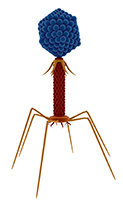Micro(bes)

Increasingly, the mind-blowing technology portrayed in science fiction movies is made real in labs around the world. In particular, two recently published studies are reminiscent of Star Wars.
The first study engineered viruses to generate electricity! One day they may power nano-scale implanted devices in the human body. The viruses used in the studies attack bacterial cells and are simple organisms with proteins and a genome. The proteins 'coat' the genome, protecting it as it enters the bacterial cell.
In one particular virus, the proteins have two distinct ends, one with one positive charge and the other with a negative charge. This arrangement of opposing charges at opposite ends of the same molecule can create a piezo-electric effect. It means when the shape of these molecules are compressed, they generate an electric current.
Researchers used the concept to build tiny bio-generators that could be activated by a person's movements, such as stair climbing. They may one-day power implanted devices that sense and report the levels of important compounds like glucose or neurotransmitters.
Another amazing technology is the biological ion transistor computer chip - the first ever produced. In these biological transistors, charged molecules called ions take the place of electrons. In essence, this means a computer chip can now network with human cells.
In recent experiments, researchers used a powerful neurotransmitter called acetylcholine as the charged molecule. Acetylcholine is a muscle activator. When a message from the brain travels along the nerves to a muscle, a neuron transmits acetylcholine ion to nearby muscle cells and triggers movement. In theory, the ion transistor could be wired and integrated into the nervous system to do the same job.
In the future, this could allow 'fine' control of muscle movement or more importantly, restore movement in people with paralysis.
More Information
✔ Supercharging the nervous system with biological, ion transistor computer chips
A short article by Sebastian Anthony on the research by Dr. Tybrandt in Sweden on his biological ion computer chip research.
✔ Electronics Go Viral
A well-written ScienceNow article by Robert Service discussing the piezo-electric energy production of bacteriophage proteins.